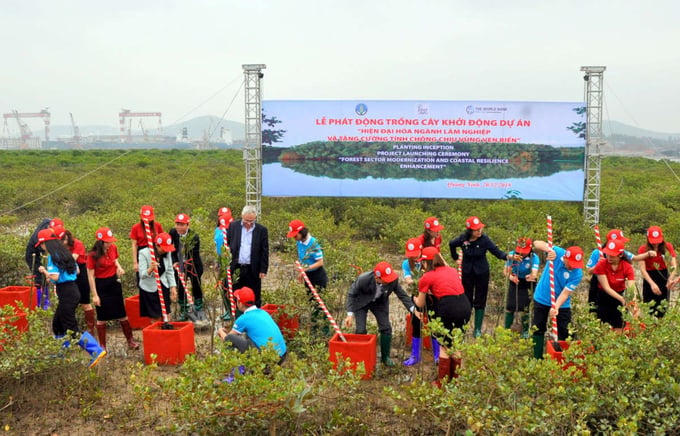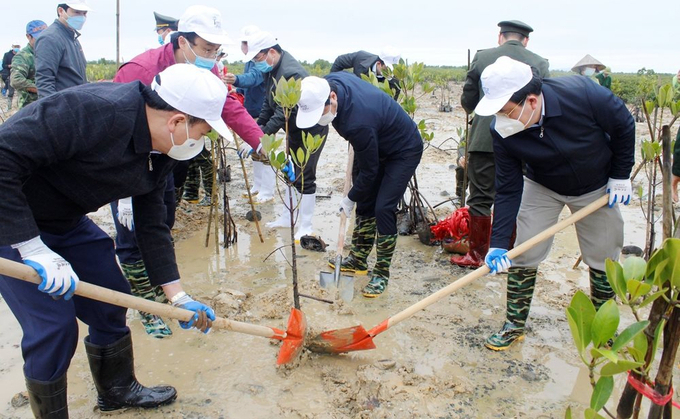November 26, 2025 | 15:35 GMT +7
November 26, 2025 | 15:35 GMT +7
Hotline: 0913.378.918
November 26, 2025 | 15:35 GMT +7
Hotline: 0913.378.918

Delegates participated in planting mangroves in Le Loi commune, Hoanh Bo district, when launching the FMCR Project in December 2019 in Quang Ninh. Photo: Tung Dinh.
The Forest Sector Modernization and Coastal Resilience Enhancement project (FMCR), funded by the World Bank, was implemented from December 2019 to December 31, 2023, and deployed in eight provinces and cities. There are Quang Ninh, Hai Phong, Thanh Hoa, Nghe An, Ha Tinh, Quang Binh, Quang Tri, Thua Thien Hue.
The primary investment content of the project includes planting and restoring forests; constructing works to prevent landslides, cause sedimentation, and create afforestation grounds; upgrading infrastructure for production, processing, and marketing of goods; Investing in technology to serve the development of agriculture, forestry and fishery production.
Intending to improve coastal forest management in the provinces in the project area to increase resilience to adverse weather events and rising sea levels, the FMCR project clearly defines the financial mechanism. In particular, forest planting and restoration activities are the tasks of the Ministry of Agriculture and Rural Development (MARD).
Funding for construction activities, upgrading works, infrastructure, technology, and building boundary markers is borrowed from the locality, and the Provincial People's Committee is the investment manager. Approval authority belongs to the Chairman of the Provincial People's Committee based on the consensus of the World Bank.
Regarding the implementation mechanism, the People's Committees of provinces and cities own local component projects. They are fully responsible for the order, approval procedures, and implementation steps locally, including bidding, construction, inspection, supervision, acceptance, settlement, etc.
The Management Board for Forestry Projects monitors, guides, and synthesizes reports and urges.
As of August 2023, through reviewing and capturing documents and procedures, the Management Board for Forestry Projects assessed that localities complied with the provisions of law and donors.
According to the plan, provinces and cities must complete the final settlement and handover before December 31, 2023. If any project is completed after this time, the local People's Committees must arrange other funding sources for implementation.

Although only about 3% of the total forest area, mangrove forests can absorb four times more carbon than forests on land. Photo: Tung Dinh.
The FMCR project started in December 2019, but due to epidemics and floods occurring in two consecutive years, 2020 and 2021, as of August 2023, the FMCR Project has only been implemented for 20 months.
Although two years of work were shortened, equivalent to more than half of the implementation time, the FMCR project has completed about 70% of the workload, including investment preparation, compared to the adjusted.
In particular, the highlight of the FMCR Project is the work of planting, caring for, and protecting forests. In 2022, the primary year of implementation, the FMCR project plants nearly 3,000 hectares of coastal protection forests, while every year, the whole country plants about 3,500 hectares.
Since implementation, the FMCR project has contributed nearly 4,000 hectares to the Project to protect and develop coastal forests to respond to climate change and promote green growth in the period 2021 - 2030, according to the Decision No 1662/QD-TTg issued on October 4, 2021.
Affirming that the FMCR Project's overarching goal is to protect coastal forests, the Management Board for Forestry Projects commits to allocating resources to maintain the management and protection of 42,000 hectares of coastal mangrove forests in the project area after 2023.
This is also the basis for creating coastal protection forest strips for eight provinces and cities to protect works, assets, and civil infrastructure in the Natural Disaster Prevention Plan, contributing to increasing resilience against natural disasters, extreme weather events, and rising sea levels.
The Prime Minister approved the FMCR project’s investment policy in 2018, which was funded by the World Bank (WB) and deployed in eight coastal provinces and cities, including Quang Ninh, Hai Phong, Thanh Hoa, Nghe An, Ha Tinh, Quang Binh, Quang Tri, and Thua Thien - Hue. The decided implementation period is from 2018 to 2023 with a total adjusted investment capital of US$ 195 million.
With the goal of community-based sustainable forestry development, the FMCR project's afforestation implementation method focuses on using local communities for implementation. Therefore, the project has supported improving lives and increasing income for households who depend on forests through livelihood packages, technical training, and technology for production.
The FMCR project also contributes in many aspects to the transportation, irrigation, and new rural programs by upgrading rural roads and embankment systems in the project communes.
Translated by Tu Quyen

(VAN) The model of making a living under the forest canopy through the agroforestry system in Van Son commune, Bac Ninh province, is expected to generate an annual income of approximately VND 30 million/ha.

(VAN) Many enterprises in Can Tho are harnessing natural energy and reducing greenhouse gas emissions in their production processes, thereby contributing to the promotion of a sustainable green transition.
/2025/11/24/3536-2-112800_176.jpg)
(VAN) Dong Nai now has tens of thousands of hectares of forests certified for sustainable management, and this area will continue to be expanded in the coming period.

(VAN) Vinh Ha hamlet (Dai Xuyen commune, Hanoi) is shifting away from small-scale farming as households adopt bioscurity into their breeder chicken models.

(VAN) Heavy rains make aquatic species more vulnerable to disease. Proactive water management and high-tech systems help farmers prevent outbreaks and protect yields.

(VAN) Greenhouses are shifting production mindsets in Binh Lu commune, enabling farmers to ‘weather the sun and rain’ and secure stable vegetable harvests throughout the year.

(VAN) Green transition is crucial for the Mekong Delta amid climate change and stricter standards, offering a path toward sustainability.